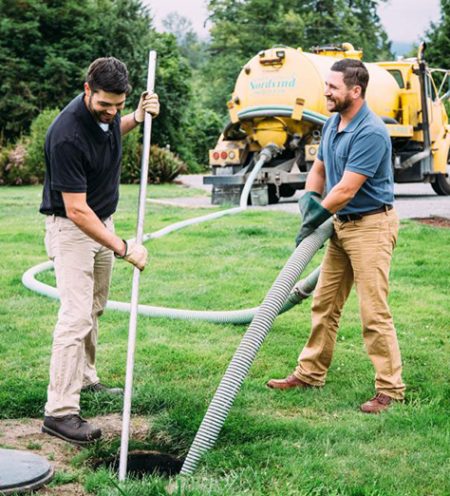If you’re a homeowner in Jacksonville, you know how important it is to maintain your septic tank. That’s where “Septic Tank Pumping In Jacksonville” comes in. With their expert team and top-of-the-line equipment, they offer professional and reliable septic tank pumping services. Whether it’s routine maintenance or an emergency situation, you can trust them to get the job done efficiently and effectively. Don’t let your septic tank give you headaches – let “Septic Tank Pumping In Jacksonville” take care of it for you.

Understanding Septic Systems
Septic systems are common in rural and suburban areas where access to a centralized sewer system is limited. They provide a safe and effective way to treat household wastewater. Understanding how septic systems work and the signs of a full septic tank is crucial for maintaining a healthy and efficient system.
An Overview of Septic Systems
A septic system consists of two main components: the septic tank and the drainfield. The septic tank is a watertight container buried underground and is responsible for holding the wastewater from your home. It allows the solids to settle at the bottom while the liquid waste flows into the drainfield for further treatment.
How Septic Tanks Work
The septic tank serves as a precursor for the treatment of household wastewater. When the wastewater enters the septic tank, it undergoes a natural separation process. The heavy solids and sludge settle at the bottom of the tank, while the lighter scum floats to the top. The liquid effluent flows out of the tank and into the drainfield, where it is further treated by the soil.
Signs of a Full Septic Tank
Knowing the signs of a full septic tank is essential to avoid costly repairs and maintain the efficiency of your system. Here are some indicators that your septic tank may be due for pumping:
Slow Drains
One of the first signs of a full septic tank is slow drains. If you notice that your sinks, showers, or toilets are draining slowly, it may be an indication that your tank is reaching its capacity. The buildup of solids and sludge in the tank can restrict the flow of wastewater, causing a delay in drainage.
Strong Odors
Another noticeable sign of a full septic tank is the presence of strong odors. A foul smell coming from your drains or yard can indicate that your tank is overflowing or that the gases produced during the decomposition of waste are not being properly vented. This is a clear indication that it’s time to get your septic tank pumped.
Pooling Water in Yard
If you notice pools of water in your yard, particularly around the area where your septic tank is located, it could be a sign that your tank is full. Pooling water occurs when the drainfield becomes saturated with untreated wastewater due to a clog or an overwhelmed septic tank. This can lead to potential health hazards and should be addressed promptly.
Importance of Septic Tank Pumping
Regular septic tank pumping is essential for maintaining the health and longevity of your septic system. It not only prevents costly repairs but also ensures the efficient functioning of the entire system.
Prevent Costly Repairs
By pumping your septic tank at regular intervals, you can avoid costly repairs and potential damage to your system. When a septic tank becomes too full, it can lead to backups, clogs, and even the failure of the entire system. These repairs can be expensive and disruptive to your daily life. The cost of septic tank pumping is significantly lower than the cost of repairing or replacing a damaged system.
Maintain System Efficiency
Regular septic tank pumping helps maintain the efficiency of your septic system. When the tank is pumped and cleaned, it allows for proper settling of solids and prevents the accumulation of sludge, which can clog pipes and cause backups. A well-maintained septic system will ensure the efficient treatment of household wastewater and prolong the lifespan of the entire system.
Frequency of Pumping
Knowing the frequency at which your septic tank should be pumped is essential for proper maintenance. Several factors can impact the pumping frequency, and a general guideline can help you determine when it’s time to schedule a septic tank pumping.
Factors Affecting Pumping Frequency
Several factors can influence how often your septic tank needs to be pumped. The size of your tank, the number of people in your household, the amount of water used, and the presence of a garbage disposal can all impact the pumping frequency. For example, a larger tank can hold more waste and may require less frequent pumping compared to a smaller tank serving the same number of people.
General Guidelines for Pumping
Although there is no one-size-fits-all answer to how often you should pump your septic tank, a general guideline can help. On average, it is recommended to have your septic tank pumped every three to five years. However, this can vary depending on the factors mentioned earlier. Consulting with a professional septic service provider can give you a more accurate estimate based on your specific circumstances.

Choosing a Professional Septic Tank Pumping Service
When it comes to septic tank pumping, it is crucial to choose a professional and reputable service provider. Here are some factors to consider when selecting a septic tank pumping company:
Experience and Reputation
Look for a company with years of experience in the industry and a solid reputation for providing quality service. A professional septic service provider should have extensive knowledge of septic systems and the skills to properly pump and maintain your tank.
Licensed and Insured
Ensure that the company you choose is licensed and insured. This provides you with the reassurance that they are qualified to perform the necessary services and protects you from any potential liability.
Efficient Pumping Process
Inquire about the company’s pumping process. A reputable service provider should use modern equipment and techniques to ensure the efficient and thorough cleaning of your septic tank. Ask about their disposal methods for the waste removed from your tank to ensure they comply with local regulations.
Preparing for Septic Tank Pumping
Before the septic tank pumping service arrives, there are a few steps you can take to ensure a smooth process.
Locating the Septic Tank
If you are unsure of the location of your septic tank, try to locate it before the scheduled pumping. Familiarize yourself with the general area where your tank is located to provide clear directions to the pumping service.
Clearing Access Points
Make sure the access points to your septic tank are clear and easily accessible. Remove any obstacles, such as debris or overgrown vegetation, that may hinder the pumping process. Clear access points ensure a faster and more efficient service.
Informing Household Members
Notify all members of your household about the scheduled septic tank pumping. Let them know that certain activities, such as doing laundry or taking long showers, should be avoided during the pumping process. It’s also important to inform them about any temporary water usage restrictions that may be in place after the pumping.

The Pumping Process
Understanding what happens during the pumping process can help you better prepare for the service. Here are the main steps typically involved in septic tank pumping:
Inspecting the Septic Tank
Before pumping, the septic service provider will visually inspect your septic tank to assess its condition and determine the amount of waste that needs to be removed. This inspection helps identify any potential issues or signs of damage that may require further attention.
Pumping and Disposing of Waste
Once the inspection is complete, the septic tank pumping process begins. Specialized equipment is used to pump the wastewater and solids from the tank into a designated holding tank on the service provider’s truck. The collected waste is then transported to a licensed facility for proper disposal.
Ensuring Proper Cleaning
After pumping, the septic service provider will rinse out the tank to remove any remaining residue or debris. Proper cleaning ensures that the tank is thoroughly emptied and minimizes the risk of future clogs or blockages. The service provider may also offer additional services, such as tank inspections or maintenance recommendations, based on their findings during the pumping process.
Maintenance Tips for a Healthy Septic System
Aside from regular septic tank pumping, there are several maintenance tips you can follow to keep your septic system in optimal condition:
Minimize Water Usage
Excessive water usage can overload your septic system and potentially lead to damage. Avoid long showers, fix any leaks promptly, and spread out water-intensive activities, such as laundry or dishwashing, throughout the week. Conserving water helps prevent unnecessary strain on your septic system.
Avoid Flushing Harmful Substances
Only flush human waste and toilet paper down the toilet. Flushing harmful substances, such as grease, medications, or harsh chemicals, can disrupt the natural bacterial balance in your septic tank and impair its ability to break down waste properly. Proper disposal of these substances through alternative methods is essential to maintaining a healthy septic system.
Regular Inspections
Schedule regular inspections with a professional septic service provider. These inspections can help identify any potential issues before they become major problems. They can also provide recommendations for maintenance or repairs based on the condition of your septic system.

Troubleshooting Common Septic System Issues
While proper maintenance goes a long way in preventing issues, occasional problems may still arise. Here are a few common septic system issues and how to troubleshoot them:
Clogs and Blockages
Clogs and blockages can occur in the pipes leading to or from your septic tank. If you experience slow drains or backups, try using a plunger or drain snake to clear the blockage. Avoid using chemical drain cleaners, as they can harm your septic system. If the issue persists, consult with a professional to determine the cause and appropriate solution.
Leakage and Groundwater Contamination
If you notice wet spots or lush vegetation around your drainfield or a foul smell in your yard, it could indicate a leak or groundwater contamination. Contact a septic service provider immediately to assess the situation and make any necessary repairs. Prompt action can prevent further contamination and environmental damage.
Malfunctioning Pump
If your septic alarm is consistently going off or you notice abnormal noises coming from your septic system, it may be a sign of a malfunctioning pump. Contact a professional to inspect and repair the pump as soon as possible. Ignoring this issue can lead to backups and damage to your septic system.
Septic Tank Pumping Costs
The cost of septic tank pumping can vary depending on several factors. Here are some factors that may influence the pumping costs:
Factors Influencing Pumping Costs
The size of your septic tank, its location, and the complexity of the job can impact the cost of pumping. Additionally, the distance from your home to the disposal facility and any additional services required, such as inspections or cleaning, can also affect the overall cost. It’s best to obtain quotes from different companies to compare prices and services.
Obtaining Quotes from Different Companies
To ensure you’re getting the best value for your money, it’s wise to obtain quotes from multiple septic tank pumping companies. Compare the prices, services offered, and customer reviews to make an informed decision. Remember, the cheapest option may not always be the best, so consider the reputation and experience of each company when making your choice.
In conclusion, understanding the basics of septic systems and knowing the signs of a full septic tank is essential for maintaining a healthy and efficient system. Regular septic tank pumping is crucial for preventing costly repairs and ensuring the longevity of your system. By following maintenance tips and troubleshooting common issues, you can keep your septic system in optimal condition. When choosing a septic tank pumping service, consider their experience, reputation, and efficient pumping process. Finally, obtaining quotes from different companies will help you find the best option for your needs. With proper care and maintenance, your septic system will continue to serve you well for years to come.

